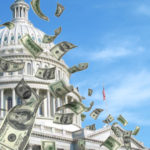Virginia utility customers who are behind on their bills in the COVID-19 recession are closer to receiving government payments toward their debts, but there is one more paperwork hurdle that may trip some of them.
A few days ago, the Virginia State Corporation Commission completed a preliminary allocation of the $100 million in federal CARES Act funding to various regulated electric, gas and water utilities around Virginia. The payments were authorized in the amended budget adopted by the recent General Assembly special session.
As they were informed of how much money had been earmarked for their overdue customers, the utilities were also informed that each of those customers will have to complete and return a three-page form and certify that their debt is due to the pandemic.
How many Virginians will need to take this step is unknown, and the utilities need to get the forms distributed, signed, and collected before applying any credits to their accounts. That job is entirely on them.
The $100 million may not be enough and SCC may run out of CARES Act money before all the bills that were 60 days overdue as of October 31 can be erased. The available funds may stretch a bit further if customers trip up and do not return those forms promptly. Also, unpaid bills have continued to accrue since October 31 and will likely do so until the emergency ban on disconnections is lifted sometime next year.
The customer questionnaire was shared with Bacon’s Rebellion and you can read it here. The answers are subject to verification, and false statements subject to prosecution.
Another wrinkle that was a surprise to some, although it shouldn’t have been, is that money can only cover debts incurred since the crisis began in March. If utilities have not figured out which accounts had debts older than that, they must add that calculation to the mix and leave the old debts standing.
The utilities themselves are also required to certify compliance with the strings attached to the federal largess, with a similar three-page set of instructions and signature form you can read here. It is due back to the SCC December 15, and indicates the whole process needs to be wrapped up by the end of January.
Bacon’s Rebellion queried Secretary of Finance Aubrey Layne about the recipient questionnaire and utility certification and he responded they are needed because the whole process is subject to a possible federal audit:
“Unfortunately, those are the requirements of the CARES grant. This has been a problem with all assistance programs, but utilities were specifically cited in the federal rules. The federal officials are concerned about revenue replacement in public utilities in addition to paying for only deficits caused directly by COVID impacts. We have given additional time for the SCC to administer the program,” Layne wrote.
Once they go out, the payments will go to the utilities and will become credits on customer bills. No customers are getting actual payments. Most, perhaps all may still be behind. The funds cannot erase late fees or interest.
The preliminary allocation was based on each utility’s report on how much it was owed in total by its overdue customers. Asked how much was allocated and to which utilities, and what percentage of the total it represented, the SCC declined to specify. It is handling the process with the utilities it regulates, but the Department of Housing and Community Development is allocating funds to municipal electric, water, and sewer providers.
A status report is due to the legislature December 31, but even that may not report specific amounts allocated to specific utilities.
The state’s dominant utility, Dominion Energy Virginia, is not part of this process. It engineered its own deal, previously discussed on Bacon’s Rebellion, to forgive some of its customer debts and then get repaid from any excess profits identified during the 2021 review of its revenue and expenses. Those funds might otherwise have been refunds to all customers.
When the smoke finally clears, the same 2020 budget revisions also authorize the utilities to eventually recover any money they are still owed – including late fees and interest – by adding a surcharge to the future bills of their paying customers.



